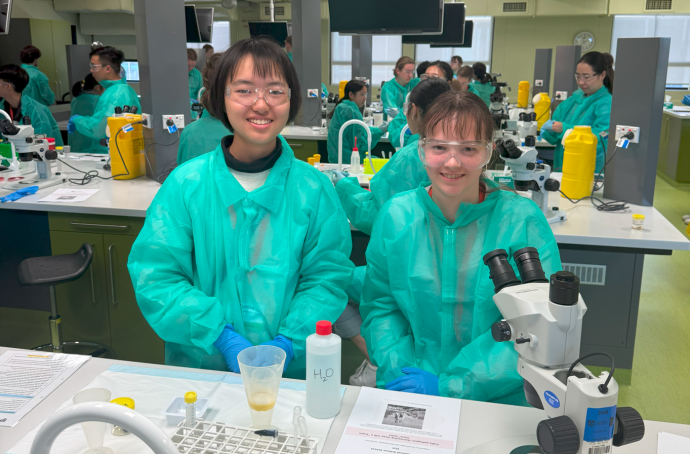Juliette Miller

Juliette Miller attended the Professor Harry Messel International Science School in Sydney in 2025 and wrote a trip report following her return, reflecting on how the experience has shown her a different view of what it means to be a scientist.
I’m Juliette Miller and I’m a year 12 student at Ao Tawhiti Unlimited Discovery in Christchurch. I have always had an interest in science, and, as I’ve gotten older, it’s developed into an interest in physics and fluid mechanics. Outside of science, I enjoy competitive figure skating and dance, which is where I spend most of my mornings and afternoons.
How has attending ISS excited you to pursue a career in STEM? Can you elaborate on what you’d like to pursue and what has inspired this?
I want to study mechanical engineering. I enjoy using physics to create new, innovative ideas that can change lives and the world.
I think before ISS, I had a different perspective on what it means to be a scientist. I thought being a theoretical physicist was sitting in a room and thinking all day every day to possibly come up with nothing for your entire life. But now I realise that being a scientist has a much more practical side and that the field of research is much more exciting than I thought. There is much more to discover and build than I ever thought there was, and the world of STEM is rapidly changing and advancing with areas like AI and quantum. This has inspired me to think about doing a double degree in engineering and physics. I want to learn about quantum and relativity as well as aeroplanes and cars and I now realise how much of a practical option this is.
What’s the most interesting thing you learned at ISS?
There were so many interesting things at ISS, I don’t even know where to start. We started off strong with dark matter and ended with quantum and lasers. I will choose to talk about Katie Mack’s talk on how the universe ends. In this, she mentioned vacuum decay, which is the possibility that we are living in a false vacuum which could transition to a true vacuum, resulting in fundamental changes to the laws of physics and the destruction of everything we know. This is not a very large possibility, but it is connected to the Higgs field and for me highlighted how much more there is to theoretical and quantum physics that I still have no idea about, and how much more there is to discover.
Did you learn or experience something unexpected at ISS?
Something I found unexpected at ISS is how much I enjoyed Katie Michie’s lecture on AlphaFold, an AI protein folding program. I enjoy biology and take it at NCEA level 2 and intend to take level 3 next year, but it has never been something that has stood out to me. That is why I expected this lecture to be interesting, but not one of my main takeaways from the programme. However, this lecture became one of my favourites among the programme. Katie taught us about how the model worked and the importance of the data sets it had been trained on. She explained how proteins folded and the issues that arise for scientists trying to work out their structures. For example, one of the traditional steps for finding the structure of a protein is to freeze it so it crystallises and then look at electron density. This is time-consuming, but it works. However, some proteins don’t crystallise, which makes finding their structure much more difficult. Some of these proteins can be cut into two so both pieces will then crystallise separately. AlphaFold works out the structure from the amino acid sequence and other background knowledge. This means it doesn’t need a crystal to work it out. This also means that AlphaFold can suggest a way to cut the protein so that it successfully freezes and its structure can be verified. AlphaFold successfully did this with the Human T-cell lymphotropic virus (HTLV) capsid protein, which was shown to have the same feature as HIV, which can lead to better treatment.
How can you use the knowledge you’ve gained at ISS to contribute to your wider community in the future?
There are various insights that I think are beneficial to share with people – different bits of knowledge that can be difficult to gain from just a quick Google search. There are also various theories and principles I can use to run experiments to inspire people with science, specifically the young kids at my school.
But I think the most important message to spread to people from ISS is that you can do it too. You can be a world-leading scientist too. There is nothing stopping you if you decide that’s what you want. You just have to believe in yourself and work hard. Alongside this, know that you can still be successful even if you don’t know what you want to study yet. Donna Strickland, who won the Nobel Prize in physics in 2018, told us she didn’t know what she wanted to do until she got to university and saw the laser lab. Some advice Chris, the director of ISS, shared with us is that you don't have to know what you want to do in the future, all you need to know is what you want to do next.
